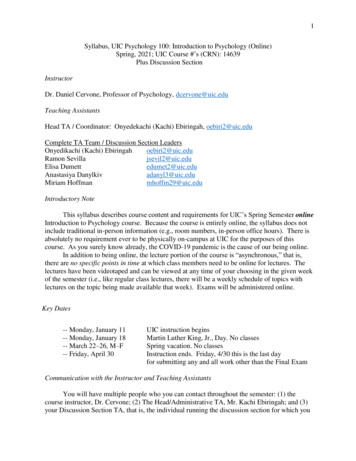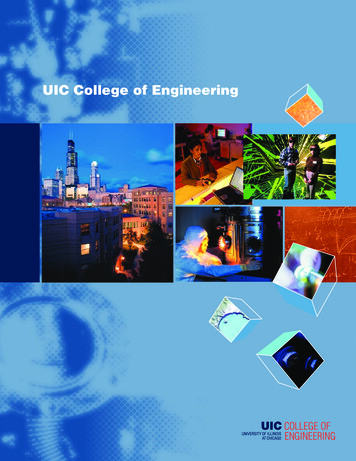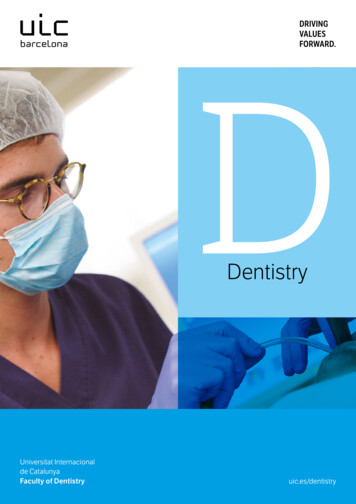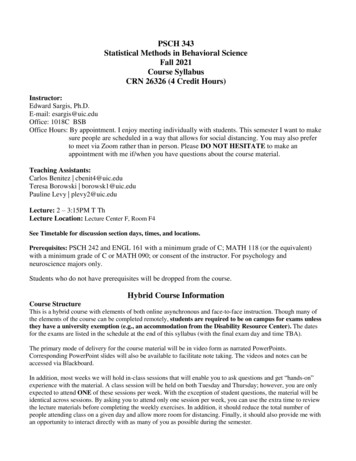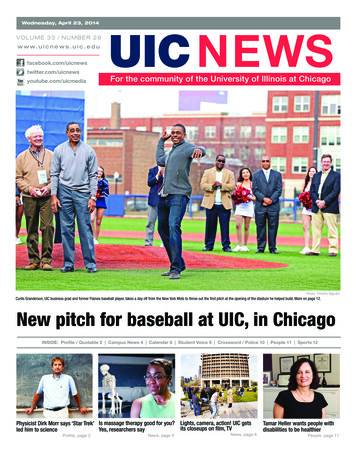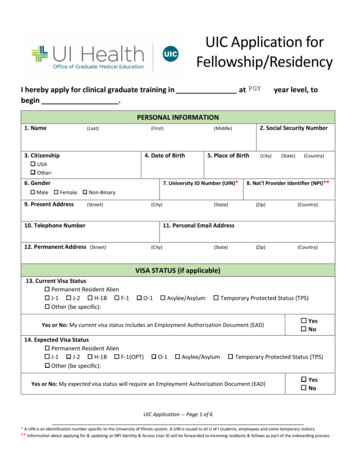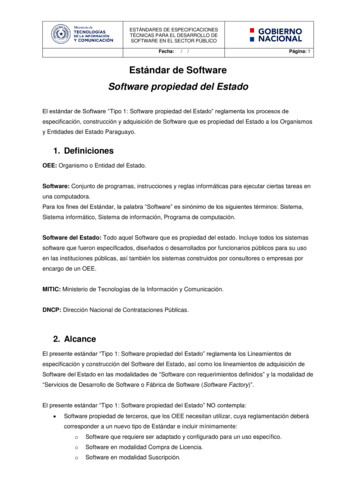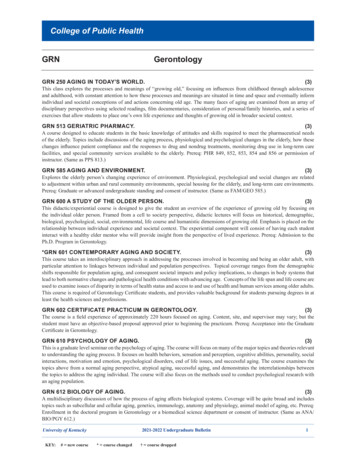
Transcription
College of Public HealthGRNGerontologyGRN 250 AGING IN TODAY’S WORLD.(3)GRN 513 GERIATRIC PHARMACY.(3)GRN 585 AGING AND ENVIRONMENT.(3)GRN 600 A STUDY OF THE OLDER PERSON.(3)*GRN 601 CONTEMPORARY AGING AND SOCIETY.(3)GRN 602 CERTIFICATE PRACTICUM IN GERONTOLOGY.(3)GRN 610 PSYCHOLOGY OF AGING.(3)GRN 612 BIOLOGY OF AGING.(3)This class explores the processes and meanings of “growing old,” focusing on influences from childhood through adolescenceand adulthood, with constant attention to how these processes and meanings are situated in time and space and eventually informindividual and societal conceptions of and actions concerning old age. The many faces of aging are examined from an array ofdisciplinary perspectives using selected readings, film documentaries, consideration of personal/family histories, and a series ofexercises that allow students to place one’s own life experience and thoughts of growing old in broader societal context.A course designed to educate students in the basic knowledge of attitudes and skills required to meet the pharmaceutical needsof the elderly. Topics include discussions of the aging process, physiological and psychological changes in the elderly, how thesechanges influence patient compliance and the responses to drug and nondrug treatments, monitoring drug use in long-term carefacilities, and special community services available to the elderly. Prereq: PHR 849, 852, 853, 854 and 856 or permission ofinstructor. (Same as PPS 813.)Explores the elderly person’s changing experience of environment. Physiological, psychological and social changes are relatedto adjustment within urban and rural community environments, special housing for the elderly, and long-term care environments.Prereq: Graduate or advanced undergraduate standing and consent of instructor. (Same as FAM/GEO 585.)This didactic/experiential course is designed to give the student an overview of the experience of growing old by focusing onthe individual older person. Framed from a cell to society perspective, didactic lectures will focus on historical, demographic,biological, psychological, social, environmental, life course and humanistic dimensions of growing old. Emphasis is placed on therelationship between individual experience and societal context. The experiential component will consist of having each studentinteract with a healthy elder mentor who will provide insight from the perspective of lived experience. Prereq: Admission to thePh.D. Program in Gerontology.This course takes an interdisciplinary approach in addressing the processes involved in becoming and being an older adult, withparticular attention to linkages between individual and population perspectives. Topical coverage ranges from the demographicshifts responsible for population aging, and consequent societal impacts and policy implications, to changes in body systems thatlead to both normative changes and pathological health conditions with advancing age. Concepts of the life span and life course areused to examine issues of disparity in terms of health status and access to and use of health and human services among older adults.This course is required of Gerontology Certificate students, and provides valuable background for students pursuing degrees in atleast the health sciences and professions.The course is a field experience of approximately 220 hours focused on aging. Content, site, and supervisor may vary; but thestudent must have an objective-based proposal approved prior to beginning the practicum. Prereq: Acceptance into the GraduateCertificate in Gerontology.This is a graduate level seminar on the psychology of aging. The course will focus on many of the major topics and theories relevantto understanding the aging process. It focuses on health behaviors, sensation and perception, cognitive abilities, personality, socialinteractions, motivation and emotion, psychological disorders, end of life issues, and successful aging. The course examines thetopics above from a normal aging perspective, atypical aging, successful aging, and demonstrates the interrelationships betweenthe topics to address the aging individual. The course will also focus on the methods used to conduct psychological research withan aging population.A multidisciplinary discussion of how the process of aging affects biological systems. Coverage will be quite broad and includestopics such as subcellular and cellular aging, genetics, immunology, anatomy and physiology, animal model of aging, etc. Prereq:Enrollment in the doctoral program in Gerontology or a biomedical science department or consent of instructor. (Same as ANA/BIO/PGY 612.)2021-2022 Undergraduate BulletinUniversity of KentuckyKEY:# new course* course changed† course dropped1
College of Public HealthGRNGerontologyGRN 615 SEMINAR IN TEACHING MEDICAL SCIENCE (MED SCIENCE TEACHING I).(2)GRN 616 TEACHING SEMINAR IN GERONTOLOGY.(2)A two (2) credit seminar course in which issues related to the theory and practice of life science education are discussed in aSocratic manner. May be repeated to a maximum of three credits. Prereq: Current enrollment in a life science graduate program.(Same as PGY 615.)The purpose of this seminar is to prepare doctoral students as classroom instructors, and to enhance instructional skills of thosestudents with teaching experience. Emphasis is placed on developing the fundamental knowledge and skills needed to survive andexcel in the classroom. Topics covered include: course development strategies; lecture preparation and delivery; interactive andgroup learning; writing for learning; student evaluation; student advising; and instructional ethics and responsibilities. Seminaractivities include development of instructional materials, thematic discussion, and demonstrations/simulations of classroomexperiences. Prereq: GRN 600 and GRN 620, or consent of instructor.*GRN 617 TEACHING PRACTICUM IN GERONTOLOGY.(1-3)This practicum provides a forum for continued development of teaching skills by combining classroom observational experiencewith formal debriefing and critical discussion sessions. Problematic and successful experiences will be discussed, and specificinstructional and learning concepts and issues will be addressed in depth. Prereq: Graduate standing and/or desire to improveteaching skills.GRN 618 EPIDEMIOLOGY OF AGING.(3)GRN 620 HUMAN AGING AND ADJUSTMENT.(3)GRN 644 DEMOGRAPHY AND AGING.(3)GRN 650 RESEARCH DESIGN IN GERONTOLOGY.(4)GRN 651 QUALITATIVE GERONTOLOGY.(3)GRN 653 LABORATORY RESEARCH IN GERONTOLOGY.(3)This course introduces the application of epidemiologic methods to the study of older persons. Prereq: Enrollment in a PublicHealth degree and SPH 605/PM 620 Intro to Epidemiology and GRN 650, or consent of instructor. (Same as SPH 618.)The intent of GRN 620 is to provide continued development (from GRN 600) of critical interdisciplinary skills in studies ofthe aging process. Students will, as a group, identify a single central issue associated with aging and conduct comprehensiveliterature reviews and appropriate research to thoroughly address that issue. Prereq: GRN 600 and admission to the Ph.D. programin gerontology.This course examines the dynamics of human population distributions, densities, and growth patterns as they relate to populationaging. The essential demographic processes of fertility, mortality, and mobility are addressed from multiple disciplinary perspectives,and topical coverage includes the environmental, social, political, economic, and cultural impacts on personal demographic behaviorand population change. Emphasis is placed on historic and contemporary meanings and influences of population diversity, and howthis diversity affects the patterns and consequences of aging across space and time.This course will provide training in research design appropriate for the study of aging and the aged and will critically assessspecial considerations involved in studying this population. Topics to be covered will include: philosophy of science; data sourcesfor research on aging (including medical informatics and clinical epidemiology sources); the use of animal models in agingresearch; special design considerations for the study of aging [reconciling age, period, and cohort effects]: longitudinal research;measurement tools for assessing the elderly [functional assessment, ADLs, life satisfaction scales, etc.] issues in interviewing olderpeople; qualitative methods in aging research; the ethics of research on aging and the aged. Prereq: Admission to GerontologyPh.D. Program.This course (1) critically evaluates different qualitative epistemologies including biography, phenomenology, grounded theory,ethnography and the case study; (2) assesses the value of alternative qualitative methodologies for gaining deeper understandingof the experience of elders; (3) explores practical issues in employing such methodologies; and (4) provides opportunities forparticipants to engage in different styles of qualitative research. Prereq: Graduate standing.Students will be exposed to current biomedical techniques by conducting supervised research in a laboratory setting. Prereq:Permission of instructor.2021-2022 Undergraduate BulletinUniversity of KentuckyKEY:# new course* course changed† course dropped2
College of Public HealthGRNGerontologyGRN 656 INTEGRATIVE STUDIES IN GERONTOLOGY.(3)GRN 660 AGING ISSUES AND FAMILY RELATIONS.(3)GRN 662 LONG-TERM CARE IN AN AGING SOCIETY.(3)GRN 704 MENTAL HEALTH AND AGING.(3)GRN 705 COGNITIVE AGING.(3)GRN 706 HEALTH PROMOTION AND AGING.(3)GRN 710 AGING OF THE NERVOUS SYSTEM.(3)GRN 720 GERONTOLOGY/GERIATRIC DENTISTRY.(1)GRN 731 ELDER MISTREATMENT.(3)GRN 749 DISSERTATION RESEARCH.(0)This seminar is designed to provide gerontology doctoral students the opportunity to place individual dissertation topics within thebroader field of gerontology, and to broaden the authority with which the students engage in their dissertation work. Although workwill largely be independently driven, frequent class meetings provide ongoing feedback from the group on progress and allow allparticipants to learn from each others work. Prereq: Completion of gerontology core requirements.The study of dynamics of family interactions and issues when some family members are elderly. Emphasis is placed on perspectivesfrom multiple generations and across various kin categories. (Same as FAM 660.)This graduate seminar provides a comprehensive overview of the philosophy, theory and practice of long-term care focusing on themanner in which such care is evolving in an aging society. The full range of long-term care options are considered including thedesign of supportive communities that support individual autonomy and reduce the need for long-term care, home and communitybased long-term care, family care, transitional options for long-term care support, and the full array of residential and institutionalalternatives. Emphasis is placed on changing care recipient and caregiver needs along the long term care continuum. Criticalperspective is provided on contemporary issues in long-term care including ethical and legal concerns, financing and public policy.The aim of this class is to provide some breadth and selected depth in the area of Mental Health and Aging, aimed at researchperspectives. Various psychiatric syndromes will be evaluated in lectures and throughout the readings in relation to prevalence,assessment, etiology, and treatment in reference to research in older adults. Prereq: Graduate student status.This is a graduate level seminar on cognitive aging. Topics to be addressed include theories of aging, memory, sensation, andperception, attention, language, social cognition, intelligence, decision-making, and dementia.In this class health promotion in old age will be examined. The theory behind health promotion programs and the status of existinghealth promotion program for older adults will be reviewed and discussed. Finally, the knowledge acquired in class will be used todevelop and demonstrate an innovative health promotion program for older adults. Prereq: Graduate student standing.This course will examine the alterations in the brain that occur with aging and in neurodegenerative disorders such as Alzheimer’sdisease. The emphasis will be on human aging although the relevance of animal models to studies of human aging will be arecurrent theme. The course will examine aging at several levels, including molecular, cellular, organismic, and behavioral. Astrong background in the basic sciences in encouraged. (Same as ANA/PGY/PHA 710.)This course is designed to help students gain an appreciation for the significant opportunities as well as challenges the agingpopulation will bring to their oral health practice. This course will provide students basic knowledge and information in gerontology/geriatric dentistry. Lecture, 17 hours. May be repeated to a maximum of two credits. Prereq: Permission of course director.This course reviews major issues and trends related to elder mistreatment. The course emphasizes individual and systemic issuesrelated to elder abuse, neglect, exploitation, and self-neglect on individual, local, state, and federal levels. Special consideration isgiven to dynamics that shape past, current, and future issues related to elder mistreatment. Prereq: Graduate student status and/orpermission of instructor.Half-time to full-time work on dissertation. May be repeated to a maximum of six semesters. Prereq: Registration for two full-timesemesters of 769 residence credit following the successful completion of the qualifying exams.2021-2022 Undergraduate BulletinUniversity of KentuckyKEY:# new course* course changed† course dropped3
College of Public HealthGRNGerontologyGRN 767 DISSERTATION RESIDENCY CREDIT.(2)Residency credit for dissertation research after the qualifying examination. Students may register for this course in the semester ofthe qualifying examination. A minimum of two semesters are required as well as continuous enrollment (Fall and Spring) until thedissertation is completed and defended.GRN 769 RESIDENCE CREDIT FOR THE DOCTOR’S DEGREE.May be repeated indefinitely.GRN 770 SPECIAL TOPICS IN GERONTOLOGY.(0-12)(1-3)This course is designed to present contemporary topics in gerontology in either a lecture or seminar format. It is intended to providestudents with opportunities to be informed of current issues in gerontology as well as to explore in-depth studies of particulargerontological topics. May be repeated to a maximum of twelve credits.GRN 771 AGING IN RURAL ENVIRONMENTS.(3)GRN 772 AGING AND THE LIFE COURSE.(3)GRN 773 ETHICS AND AGING.(3)GRN 774 PUBLIC POLICY AND AGING.(3)*GRN 775 CLINICAL GERONTOLOGY.(3)GRN 778 CURRENT TOPICS IN BRAIN AGING.(3)In the context of a changing rural environment, this seminar explores the life circumstances and life experience of rural elders inrelation to the health and well-being of this population.This seminar will establish a common foundation of knowledge through examinations of traditional “life courses” influencingindividuals as they age through time, including household and family, education and work, and housing. This foundation willbe built upon using critical examinations of such themes as gender roles, spatial experience, cognitive change and memory, andstructural effects on life trajectories. Emphasis will be placed on surveys of existing literature and on integrating various life courseelements within social and behavioral theory.The focus of this class is on applied ethics and aging. We will address the following topics: mid/late life reproduction; researchwith older adults; spirituality/selfhood; legal issues; cultural issues; vulnerable older people; caregiving and community-basedcare; specific issues related to Alzheimer’s Disease; issues at the end of life, and other timely ethical issues that may arise duringthe course. The course will make use of provocative readings, case studies, supplementary professional articles, a presentation andpaper, lively class discussion, and outside speakers who will share their expertise with you on a variety of ethical issues related toaging.This course reviews major issues and trends in the economics of aging and social policy and aging. The course emphasizes health,economic, and welfare policies and considers their implications on federal, state, and local levels. Special consideration is given todynamics that shape past, current, and future policy in the area of aging. Prereq: Graduate standing.This course is an interdisciplinary introductory course in gerontological health and the healthcare system which examines theprocesses of normal human aging, the common diseases and disorders that affect older adults, and aging in the context of the UShealthcare system. Special emphasis will be place on physical function and the ability to participate in desired roles and activitiesas well as societal supports and barriers to health among older adults in the US. The course will highlight areas of importance forthose who will be working and/or conducting research with older adults. This course provides a perspective of clinical geriatrics.This course provides an overview of important topics in health and aging in our society today. This course is designed for bothclinicians and non-clinicians. Prereq: Graduate standing.Students will learn cellular and molecular changes that occur in the brain through AD progression in addition to the impact of thesechanges on individual lifestyle and on society.2021-2022 Undergraduate BulletinUniversity of KentuckyKEY:# new course* course changed† course dropped4
College of Public HealthGRNGerontologyGRN 780 APPLIED GERONTOLOGY PRACTICUM.(1-3)GRN 781 STUDENT DEVELOPMENT PRACTICUM.(1)GRN 782 WOMEN’S HEALTH AND AGING.(3)GRN 783 PUBLIC HEALTH AND AGING.(3)This course is designed to provide students the opportunity to experience the practical application of gerontology in such domains asgovernment, administration and clinical environments. In addition, the student will gain in-depth experience with the organizationand an introduction to problems in applied research. Students will work under the supervision of a gerontology faculty member tocoordinate efforts, establish timelines for completion, and determine grading criteria. May be repeated to a maximum of six credits.Approval of the Director of Graduate Studies required.This practicum provides an opportunity for students to present and discuss their research findings in a venue that promotes skilldevelopment in the areas of preparation and delivery of research presentations. Students are required to enroll in GRN 781 duringeach of the first five semesters in residence. Prereq: Admission to Gerontology Ph.D. program.This class explores the issues related to health and well-being among older women. Using a multidisciplinary approach that blendshumanities, social and medical science and public policy, the course examines social, economic and cultural contexts of chronicphysical and mental health. Prereq: Upper level/graduate class in social science. (Same as BSC 782.)Public Health and Aging is an elective course in the Graduate Center for Gerontology and Department of Health Behavior andis offered to students on the graduate level. The focus of the course is to help students identify a public health framework and aparadigm for addressing the issues of social, emotional, physical, and mental health in older adults, as well as a keen understandingand awareness of chronic disease prevention, mortality, and quality of life issues that are germane to aging in the United States.Prereq: Graduate standing.GRN 785 INDEPENDENT RESEARCH IN GERONTOLOGY.(1-6)GRN 786 INDEPENDENT READINGS IN GERONTOLOGY.(1-6)Open to doctoral students who have the necessary training and ability to conduct research at an advanced level. Students willwork under the supervision of a gerontology faculty member to coordinate research efforts, establish timelines for completion, anddetermine grading criteria. May be repeated to a maximum of 9 credits. Approval of the Director of Graduate Studies required.Open to doctoral students who have the necessary training and ability to work independently at an advanced level. Studentswill work under the supervision of a gerontology faculty member to identify readings appropriate for the student’s chosen topic,establish timelines for completion, and determine grading criteria. May be repeated to a maximum of nine credits. Approval of theDirector of Graduate Studies required.GRN 790 PROFESSIONAL DEVELOPMENT IN GERONTOLOGY.(1)This seminar will cover elements of professional development in the areas of research, teaching and service as students are preparedfor obtaining positions and developing careers in gerontology. Emphasis will be placed on means of documenting progress andaccomplishment (e.g., CV building, teaching portfolio development, evaluation), effective strategies for searching for and securingjobs (e.g., interview skills), and strategies for promoting quality performance and professional success in gerontology-relatedprofessions. Prereq: Admission to the Gerontology Ph.D. program.2021-2022 Undergraduate BulletinUniversity of KentuckyKEY:# new course* course changed† course dropped5
oee of uic et GR Gerontology KEY ne ure ure anged ure dred . GRN 610 PSYCHOLOGY OF AGING. (3) This is a graduate level seminar on the psychology of aging. The course will focus on many of the major topics and theories relevant . (including medical informatics and clinical epidemiology sources); the use of animal models in aging

